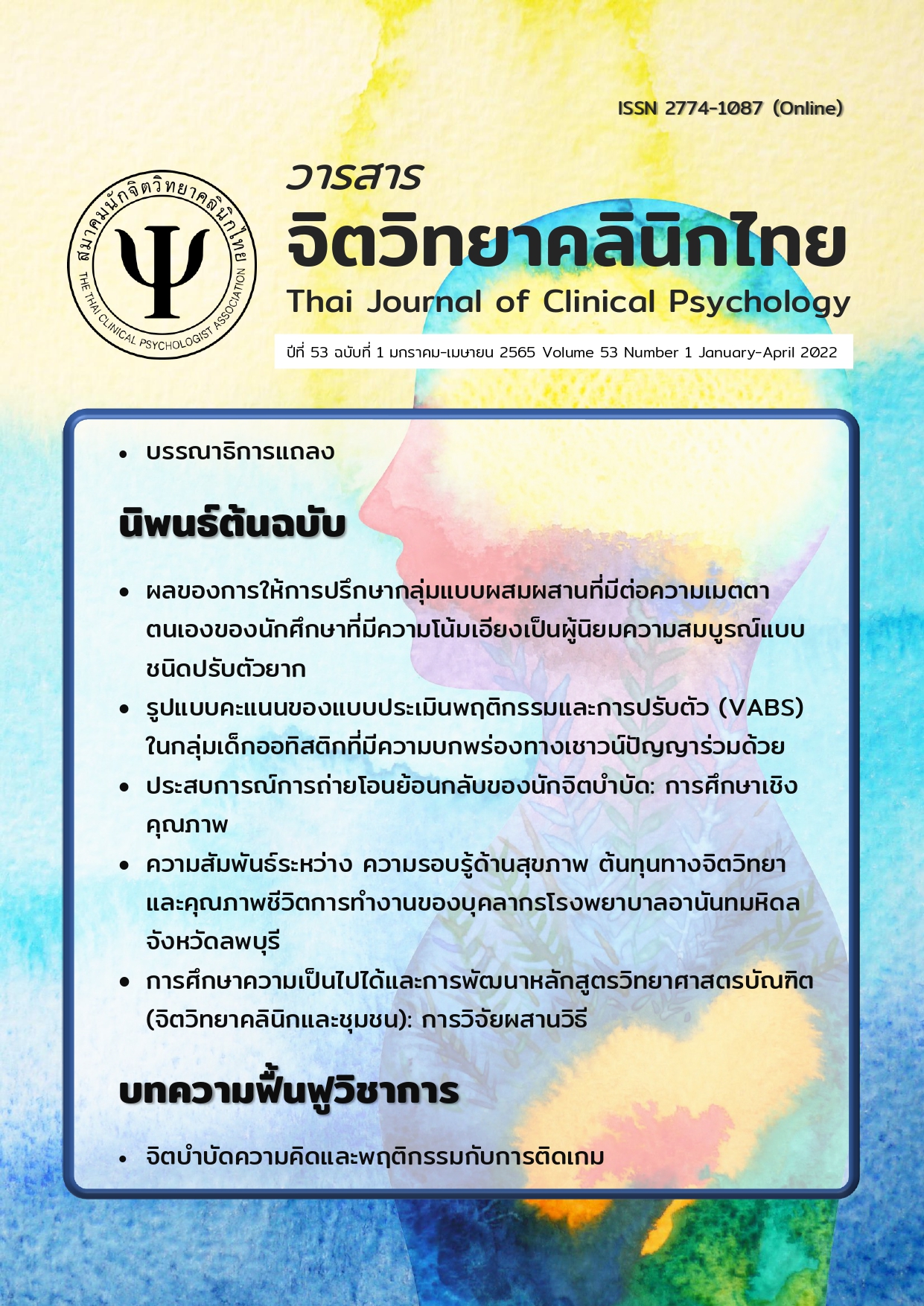ผลของการให้การปรึกษากลุ่มแบบผสมผสานที่มีต่อความเมตตาตนเองของนักศึกษาที่มีความโน้มเอียงเป็นผู้นิยมความสมบูรณ์แบบชนิดปรับตัวยาก
Main Article Content
บทคัดย่อ
วัตถุประสงค์ งานวิจัยกึ่งทดลอง (quasi-experimental research) แบบมีกลุ่มควบคุมและมีการทดสอบก่อนและหลัง (pre test- post test control group design) ในครั้งนี้ มีวัตถุประสงค์เพื่อศึกษาผลของการให้การปรึกษาแบบผสมผสานตามแนวคิดการบำบัดด้วยการยอมรับและความมุ่งมั่น (acceptance and commitment therapy) และ การให้การปรึกษากลุ่มผ่านโครงสร้างกิจกรรมของทรอซเซอร์ที่มีต่อความเมตตาตนเอง วัสดุและวิธีการ มีผู้เข้าร่วมงานวิจัยเป็นนักศึกษาที่มีความโน้มเอียงเป็นผู้นิยมความสมบูรณ์แบบจำนวน 18 คน โดยประเมินจากแบบวัดที่ผู้วิจัยแปลและพัฒนามาจากแบบวัด the revised almost perfect scale ของ Slaney et al. (2001) โดยแบ่งเป็นกลุ่มทดลอง (n=9) และ กลุ่มควบคุม (n=9) ผู้เข้าร่วมในกลุ่มทดลองจะเข้าร่วมโปรแกรมการให้คำปรึกษากลุ่มแบบผสมผสานจำนวน 8 ครั้ง ครั้งละ 1.5 ชั่วโมง ส่วนกลุ่มควบคุมไม่ได้รับการเข้าร่วมโปรแกรมวิเคราะห์ข้อมูลโดยใช้สถิติ ร้อยละ ค่าเฉลี่ย สถิติทดสอบ Shapiro-Wilk และสถิติทดสอบค่าที (t-test) ผลการศึกษา ผู้เข้าร่วมในกลุ่มทดลองมีค่าเฉลี่ยของระดับความเมตตาตนเองหลังการเข้ารับโปรแกรมสูงกว่าก่อนเข้ารับโปรแกรมอย่างมีนัยสำคัญทางสถิติที่ระดับ .01 และค่าเฉลี่ยของคะแนนความเมตตาตนเองของนักศึกษาในกลุ่มทดลองหลังเข้ารับโปรแกรมสูงกว่าค่าเฉลี่ยของกลุ่มควบคุมอย่างมีนัยสำคัญทางสถิติที่ระดับ .01 สรุป การให้การปรึกษากลุ่มแบบผสมผสานสามารถเพิ่มความเมตตาตนเองในกลุ่มนักศึกษาที่มีความโน้มเอียงเป็นผู้นิยมความสมบูรณ์แบบชนิดปรับตัวยาก
Article Details

อนุญาตภายใต้เงื่อนไข Creative Commons Attribution-NonCommercial-NoDerivatives 4.0 International License.
เรื่องที่ลงตีพิมพ์ในวารสารจิตวิทยาคลินิกแล้วถือเป็นลิขสิทธิ์การเผยแพร่โดยวารสารจิตวิทยาคลินิกแต่เพียงผู้เดียว การตีพิมพ์หรือเผยแพร่ซ้ำในที่อื่นต้องได้รับอนุญาตจากกองบรรณาธิการวารสารฯ
เอกสารอ้างอิง
Boonsrangsom, W. (2013). The relationship between percieved stress and happiness of university students with self-compassion as a mediator. (unpublished master’s thesis). Chulalongkorn Univeresity. (in Thai).
Crowder, R. (2016). Mindfulness based feminist therapy: The intermingling edges of self-compassion and social justice. Journal of Relegion & Spirituality in Social Work: Social Thought, 35:1-2, 24-40g, https://doi.org/10.1080/15426432.2015.1080605
Curran, T. & Hill, A. P. (2017). Perfectionism is increasing over time: A meta-analysis of birth cohort differences from 1989 to 2016. Psychological Bulletin, 145(4), 410–429. https://doi.org/10.1037/bul0000138
Curran, T. & Hill, A. P. (2018). How Perfectionist Become a Hidden Epidemic among Young People. The Conversation. https://theconversation. com/how-perfectionism-became-a-hidden-epidemic-among-young-people-89405
DeLucia-Waack, J. L., Kalodner, C. R., & Riva, M. T. (2014). Handbook of group counseling and psychotherapy. SAGE.
Frank, T. (2016). Listen liberal: Or what ever happened to the party of the people?. Metropolitan Books.
Fong. V. L. (2004). Only hope: coming of age under china’s one-child policy. Stanford University Press.
Hayes, S. C. & Smith, S. (2004). Get out of your mind & into your life: The new acceptance & commitment therapy. New Harbinger.
Lazarus, A. A., & Beutler, L. E. (1993). On echnical clecticism. Journal of Counseling & Development. 71, 381-385.
Lazarus, A. A., Beutler, L. E., & Norcross, J. C. (1992). The future of technical eclecticism. Psychotherapy. 29(1), 19-20.
Mcloughlin, C. S. & Noltemeyer, A. (2010).The Perfectionist Child: Strategies for Parents [CD-ROM]. Helping Children at Home and School lll. National Association of School Psychologists.
Mehr, K. E. & Adams, A. C. (2016). Self-compassion as a mediator of maladaptive perfectionism and depressive symptoms in college Student. Journal of College Student Psychotherapy. 30(2), 132-145. https://doi.org/10.1080/87568225.2016.1140991
Mistler, B. A. (2010). Forgiveness, Perfectionism, and the Role of Self-Compassion [Doctoral dissertation, University of Florida]. The University of Florida Digital Collections. https://ufdc.ufl.edu/UFE0041448/00001/ pdf/0
Murayama, K., Pekrun, R., Suzuki, M, Marsh, H. W.& Lichtenfeld, S. (2016). Don’t aim too high for your kids: Parental overaspiration undermines students’ learning in mathematics. Journal of Personality and Social Psychology. 111(3). 766-779. https://doi.org/10.1037/pspp0000079
Neff, K. D. (2003a). Development and validation of a scale to measure self-compassion .Self and Identity. 2, 223-250. https://doi.org/10.1080/1529 8860390209035
Neff, K. D. (2003b). Self-compassion : An alternative conceptualization of healthy attitude toward oneself. Self and Identity. 2, 85–101, https://doi. org/10.1080/15298860390129863
Neff, K. (2011). Self-Compassion: stop beating yourself up and leave insecurity behind. HarperCollins.
Trotzer, J. P. (2006). Counselor and the group: Integrating theory, training, and practice. (4th ed.). Taylor & Francis.
Slaney, R. B., Rice, K. G., Mobley, M., Trippi, J., & Ashby, J. S. (2001). The revised almost perfect scale. Measurement and Evaluation in Counseling and Development. 34, 130-145. https://doi.org/10.1080/07 481756.2002.12069030
Wienglor, A. & Arin, N. (2018). Effects of trotzer’s group counseling on self compassion and social adjustment of youths from divorced families. Journal of Human Sciences, 19(2), 11-35. https://so03.tci-thaijo.org/index.php/JHUMANS/article/view/163189
Yadavaia, J. E., Hayes, S. C. & Vilardaga, R. (2014). Using acceptance and commitment therapy to increase self-compassion: A randomized controlled trial. Journal of Contectual Behavioral Science. 3, 248-257. https://doi.org/10.1016/j.jcbs.2014.09.002


